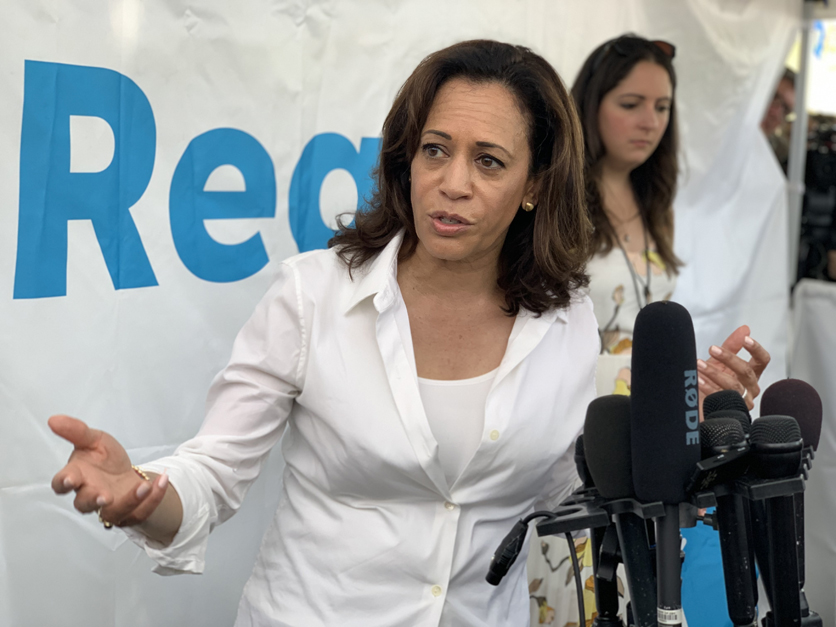Kamala Harris, Joe Biden’s pick as his Democratic running mate, has gone on record opposing new trade agreements, including the U.S.-Mexico-Canada Agreement, and has taken up the interest of farmworkers during her short tenure in the U.S. Senate.
Harris, a former California attorney general, was elected to the Senate in 2016 to succeed fellow Democrat Barbara Boxer. Her four-year Senate tenure hasn't produced a long voting record on agriculture and trade policy, but she supported the 2018 farm bill and took stands on some rural issues. She also traveled Iowa extensively during her relatively short presidential campaign that ended in December 2019, two months before the Iowa caucuses.
She was one of only 10 senators to vote against the USMCA implementing bill.
“Trade policy for me is always going to be about protecting American workers, about protecting our environment and having those part of our priorities. It is for that reason and many others that I am not in favor what I call NAFTA 2.0,” she told reporters at the Iowa State Fair in August 2019, explaining her opposition to USMCA.
She also opposed the Trans-Pacific Partnership, which was negotiated by the Obama administration. Biden has since turned against the deal, from which Trump ultimately withdrew the United States.
Sara Neagu-Reed, associate director for federal policy for the California Farm Bureau Federation, told Agri-Pulse that Harris “understands the unique issues our state's producers face verses the rest of the nation” and has helped in addressing several of the group's policy concerns.
She “was very helpful during the farm bill negotiations on many fronts, mechanization research funding being one,” Neagu-Reed said.
Harris also assisted the group in addressing a trade dispute with Argentina over lemons and “engages with us on the ag immigration reform issues as well,” said Neagu-Reed.
An environmental group that opposes the Delta tunnels project, which would transfer water to growers in the southern part of the state, applauded Biden’s pick of Harris.
"Senator Harris is a very smart and fair leader," said Barbara Barrigan-Parrilla, executive director of Restore the Delta in Stockton, Calif. "She will work productively with all parties to help solve California's water challenges."
Justin Jordan, an Iowa farmer who participated in a roundtable with Harris in August 2019, said in an op-ed for the Des Moines Register that she "asked great questions about how to empower families like mine to innovate and lead on our farms. She, too, promotes agriculture as part of the solution to climate change and included farmers in her powerful climate plan for the people during her Iowa caucus campaign."
Former Iowa Lt. Gov. Patty Judge, who co-founded a group called Focus on Rural America, which is trying to elect Democrats in the rural Midwest, said Harris’ battles with oil companies as California attorney general shows she would challenge the industry over usage of biofuels.
Harris pledged during her presidential campaign to stop EPA from providing refiners exemptions from ethanol usage mandates.
"We urge her to continue to be a champion for us and work hard to continue to bring to light the failed policies of the Trump administration that have brought our farmers and rural communities to the edge of financial ruin,” Judge said. “She has promised to lead the fight against Trump’s disastrous trade wars and the abuse of small refinery waivers to benefit Big Oil.”
California’s other senator, Dianne Feinstein, has long taken the lead on immigration and farmworker issues, but Harris has shown an interest there as well. She backed Feinstein's efforts to provide a path to legal status for farmworkers who are in the country illegally.
In February, Harris reintroduced the Fairness for Farmworkers Act, which would amend the Fair Labor Standards Act to grant overtime protections to farmworkers employed more than 40 hours a week. The bill also would remove exemptions to overtime pay for workers employed in irrigation projects, livestock auctions, grain elevators, cotton gins, agricultural transportation and some sugar processing operations.
The United Food and Commercial Workers International Union, whose members include meatpacking plant workers, welcomed the Harris pick as well, saying she and Biden would seek to protect the health and safety of essential workers. They "have made clear that our nation's CEOs and elected leaders must put these workers first by reinstating hazard pay, expanding COVID testing, and strengthening access to the protective gear these brave workers need to do these essential jobs."
While campaigning in Iowa, Harris also pledged to make rural development a priority. She proposed to spend $80 billion on rural broadband expansion and provide a $10,000 tax credit for each job businesses created in rural development zones designated by the Agriculture Department.
Interested in more coverage and insights? Receive a free month of Agri-Pulse West.
Matt Russell, an ag policy activist who hosted Harris at his Iowa farm in August 2019, said on Facebook Tuesday that “she was a great listener and absolutely top shelf in interacting with the gang of Rural Iowans we brought together to talk with her.”
Former Iowa Governor Tom Vilsack said he was “thrilled” with the selection of Harris. “Senator Harris will help Vice President Biden hold President Trump accountable for the poor Iowa farm economy resulting from a disastrous trade war and the Trump Administration siding with Big Oil at the expense of our ethanol industry”
During a CNN town hall focused on climate issues, Harris was asked whether consumers should be encouraged to consume less meat as a way to reduce greenhouse gas emissions. Harris said that policy makers needed to strike a balance between "creating incentives and just banning something." She added, "I love cheeseburgers from time to time. I just do."
Like Biden she wants to increase the use of electric vehicles.
For more news, go to www.Agri-Pulse.com.


